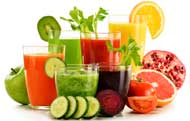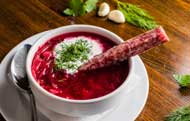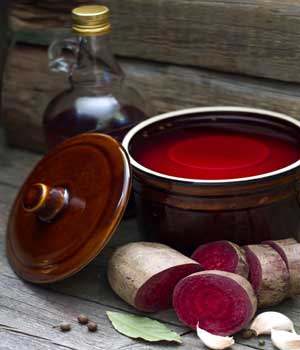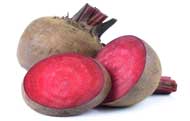





1. Beetroot Facts
2. Beetroot History and Origin
3. Beetroot Nutritional Value
4. Beetroot Health Benefits
Beet or Beta vulgaris is a plant in the Amaranthaceae family. The roots are most commonly deep red-purple, however there are lighter, less common varieties available.
History and Origin
The various wild and cultivated varieties of Beets have a long an interesting history. The first cultivated forms are believed to have been in the Mediterranean with it being introduced to the Middle East, India and then to China by 850 AD. They were used as medicinal plants in Ancient Greece and Medieval Europe.
Ancient Romans used Beetroot to treat fevers and constipation. It was used in certain soup recipes as a laxative. Beetroot juice has been considered an aphrodisiac (sexual stamina) since Roman times. It is known to be used internally as a juice, by some cultures, for the treatment of respiratory disorders, fevers and infections. Throughout ancient times there is an indication that some beet leaves have been used to bind wounds.
- • Albino (heirloom)
- • Bull's Blood (heirloom)
- • Chioggia (heirloom)
- • Crosby's Egyptian (heirloom)
- • Cylindra / Formanova (heirloom)
- • Detroit Dark Red (heirloom)
- • Early Wonder (heirloom)
- • Golden Beet / Burpee's Golden (heirloom)
- • Perfected Detroit
- • Red Ace (hybrid)
- • Ruby Queen
- • Touchstone Gold
Vegetables " Beetroot " ( Nutritional value )
Nutritional value per 100 g
Beets, cooked, boiled, drained
|
Nutrient ( Proximate's )
|
Unit
|
Value
|
Daily Value %
|
|
Energy
|
kcal
|
44
|
2.2%
|
|
Protein
|
g
|
1.68
|
3.3%
|
|
Total lipid (fat)
|
g
|
0.18
|
0.2%
|
|
Carbohydrate, by difference
|
g
|
9.96
|
3.6%
|
|
Fiber, total dietary
|
g
|
2.0
|
7.1%
|
|
Sugars, total
|
g
|
7.96
|
|
|
Minerals
|
|||
|
Calcium, Ca
|
mg
|
16
|
1.2%
|
|
Iron, Fe
|
mg
|
0.79
|
4.3%
|
|
Magnesium, Mg
|
mg
|
23
|
5.4%
|
|
Phosphorus, P
|
mg
|
38
|
3%
|
|
Potassium, K
|
mg
|
305
|
6.4%
|
|
Sodium, Na
|
mg
|
77
|
3.3%
|
|
Zinc, Zn
|
mg
|
0.35
|
3.1%
|
|
Copper, Cu
|
mg
|
0.074
|
8.2%
|
|
Manganese, Mn
|
mg
|
0.326
|
14.1%
|
|
Selenium, Se
|
mcg
|
0.7
|
1.2%
|
|
Vitamins
|
|||
|
Vitamin C, total ascorbic acid
|
mg
|
3.6
|
4%
|
|
Thiamin (B-1)
|
mg
|
0.027
|
2.2%
|
|
Riboflavin (B-2)
|
mg
|
0.040
|
3%
|
|
Niacin NE (niacin) (B-3)
|
mg
|
0.331
|
2%
|
|
Pantothenic acid (B-5)
|
mg
|
0.145
|
2.9%
|
|
Vitamin B-6
|
mg
|
0.067
|
3.9%
|
|
Folate DFE (dietary folate) (B-9)
|
mcg
|
80
|
20%
|
|
Vitamin B-12
|
mcg
|
0.00
|
|
|
Vitamin A, RAE (retinol)
|
mcg
|
2
|
0.2%
|
|
Vitamin E (alpha-tocopherol)
|
mg
|
0.04
|
0.2%
|
|
Vitamin D (D2 + D3)
|
mcg
|
0
|
|
|
Vitamin K (phylloquinone)
|
mcg
|
0.2
|
0.1%
|
|
Lipids
|
|||
|
Saturated Fatty Acids
|
g
|
0.028
|
|
|
Monounsaturated Fatty Acids
|
g
|
0.035
|
|
|
Polyunsaturated Fatty Acids
|
g
|
0.064
|
|
|
Trans Fatty Acids
|
g
|
0.000
|
|
|
Carotenoids
|
|||
|
Beta-Carotene
|
mcg
|
21
|
|
|
Lutein + zeaxanthin
|
mcg
|
0
|
|
|
Lycopene
|
mcg
|
0
|
|

|
Reference Values are based on a 2,000 Calorie Intake, for Adults and Children 4 or More Years of Age. Your daily values may be higher or lower depending on your calorie needs.
|
|
Percentages are roughly approximated using (RDA) Recommended Dietary Allowances for adults. Source: Nutrient Database - USDA (United States Department of Agriculture)
|
|
Reference Values for Nutrition - FDA U.S. Food and Drug Administration
|
Beetroot Nutritional Value
There are many Russian centenarians who often consume the traditional Russian soup of Borscht. The main ingredient for this soup is of course, beetroot. It is believed their longevity is due to all the health benefits included in beetroot. Beetroot contains powerful nutrient compounds that help protect against heart disease, birth defects and certain cancers (colon cancer).
Research indicates that beetroot keeps blood sugar levels in control, can improve sexual stamina, lowers blood pressure and is an antidote for anaemia.
In Roman times it is believed to have been used to treat fevers, constipation, wounds, skin problems and used as an aphrodisiac.
Researchers believe that the nitrate content in beetroot helps lower blood pressure and may help heart disease. It is believed that drinking beetroot juice increases blood flow to the brain in older people which may fight the progression of dementia.
- CORONARY HEART DISEASE
Phytochemical compound, glycine betaine - ANAEMIA
Iron content - CONSTIPATION
High soluble fibre content - CANCER
Betacyanin content helps slow the growth of tumors - DEMENTIA
Nitrate when converted to nitrite helps better neural transmissions to the brain

- PREGNANT WOMEN (unborn child)
Abundant supply of folic acid - STAMINA (sexual)
Rich source of nitrates which increases blood flow - FATIGUE
Rich source of nitrates and iron content - DIGESTIVE TRACT
Fiber content - CHOLESTEROL
Large amounts of soluble fibres, flavanoids and betacyanin - reducing heart attacks and strokes
References
|
Nutrient Database - USDA (United States Department of Agriculture)
|
|
Reference Values for Nutrition - FDA U.S. Food and Drug Administration
|
For More Information
Beets Facts and History - From Wikipedia, the free encyclopedia
Share
